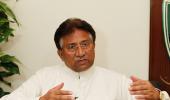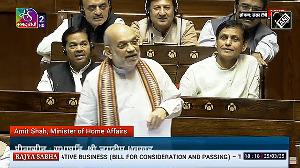The full-court press on India over Ukraine, the BBC 'documentary', the Oxfam report, the Hindenburg attack on Adani and obliquely on the Indian economy, and any number of other acts are signs that India is a target, warns Rajeev Srinivasan.

Now that the hosannas to Pervez Musharraf have reached a crescendo (eg Michael Kugelman of Foreign Policy: '...[he] could have well authored a peace deal with India'), perhaps it's worth remembering not only the 'how' of the Gujarat riots of 2002, but also the 'why'.
People seem to be suffering from selective amnesia about what happened then, and that's what the BBC's hatchet job on Modi is taking advantage of.
Most of us have forgotten. I was paying close attention then, and wrote quite a bit about what happened, but the details are a bit hazy.
And so it is easy to 'frame' the events in ways that push certain agendas.
Here are a few facts that I remember from those days:
- Narendra Modi was an unknown then. He had been thrust into the limelight after the Bhuj earthquake in 2001, and underwent a baptism by fire, so to speak.
- After the torching of the Sabarmati Express and the gruesome burning alive of 59 pilgrims, the chatterati felt that they deserved it for being Hindu pilgrims returning from Ayodhya. The Washington Post quoted Teesta Setalvad saying exactly this (external link).
- There were no funeral processions for the dead, which would have inflamed passions; indeed the dead remain nameless, and nobody knows their individual stories.
This is in sharp contrast to the funeral processions of slain terrorists in J-K, and tear-jerking stories from sympathetic media about their being sons of headmasters or whatever.
- The Sabarmati Express burning was perpetrated on February 27, riots began on the 28th, and the Indian Army was on the ground one day later, on March 1.
But analysts pretended that February has 31 days, and said 'Modi did nothing for 3 days'. - Nearby Congress governments (eg, in Madhya Pradesh) refused to send armed police contingents that might have controlled the riots.
- There is, in the background, the massing of the Indian Army at the Pakistan border, in Operation Parakram.
The Gujarat riots entirely dissipated the momentum behind a possible punitive invasion.
I wrote several columns at the time, and re-reading them brings up a number of points I had forgotten: Blaming the hindu victim, Godhra, secular progressives, Predatory intelligentsia.
Most of the focus of the coverage has been on the riots, in which officially 790 Muslims and 254 Hindus were killed.
There was a Banerjee Commission that concluded the train coach had been subject to spontaneous combustion.
A Supreme Court SIT concluded, on the contrary, that there was a conspiracy to set the coach on fire. Activists contributed disinformation.
Thus, a lot has been said about how the riots happened, but there has been relatively little about why they did.
That's where Operation Parakram and Musharraf (who was in power in Pakistan at the time) come into the picture.
By several accounts, Musharraf was a good tactician, but a poor strategist, as seen, for example, in the Kargil War: he had the advantage of surprise, but he was forced into an ignominious retreat.
The same thing was probably behind the Parliament attack on December 13, 2001.
In the wake of the September 2001 attack on the World Trade Center in New York, Pakistan was facing heat from the Americans for possibly harbouring Osama bin Laden.
What better than to divert attention with an assault on the hated BJP government in India, using terrorist cannon-fodder?
There had also been an attack on the J&K assembly in October 2001, for which there had been no serious consequences.
Tactically clever, but not so strategic. For, not only did the attacks fail to do any major damage, it got India so riled up that under Operation Parakram India massed troops on the border.
The signal was that India was going to invade, despite the Pakistani threat of first use of nuclear warheads.
India seemed resolute, and counter-mobilisation was getting expensive to sustain.
There was interesting chatter on the leftist Internet at the time that 'something' would happen to break the deadlock (I was not aware of it then, but it was discussed by the Bharat-Rakshak forum then).
And that 'something' was quite likely the Sabarmati Express burning. It was a tactical success: India had to abandon Operation Parakram.
But perhaps it was a strategic failure because it launched Narendra Modi's national political career, and here we are in 2023: Musharraf is dead, Modi is popular, and the Indian economy is doing rather well.
Of course, there are forces that are not so happy with all this: eg, the very same Deep State that likes Armani-suited, Gucci-wearing generalissimos like Musharraf.
There is a regime-change operation in the works.
First, there was Victoria Nuland, the architect of Ukraine's regime-change (and we all know how well that has turned out for Ukraine), who showed up in Delhi last year, and met the usual suspects.
Then there has been a slew of recent activity that is, one might hypothesise, aimed at containing India's rise, and a key aspect of it is ejecting Modi.
The full-court press on India over Ukraine, the BBC 'documentary', the Oxfam report, the Hindenburg attack on Adani and obliquely on the Indian economy, and any number of other acts are signs that India is a target.
The most recent incident is a visit by Hillary Clinton to Gujarat.
A case could have been made for denying her a visa, for war crimes in Libya on her watch, including the brutal killing of Muammar Gaddafi in 2011.
That would only have been sweet revenge for the US denying Modi a visa citing the Gujarat riots.
Modi, as the WSJ reports, was the only person ever denied a visa based on an obscure law on religious freedom (external link).
The attention being paid to India by the Deep State is alarming. We can expect any number of additional acts.
The 2024 Election Season is well and truly up and running, although it would be wise of Deep State to focus on what's happening in the US: Their candidate may well lose, given the stories coming out of the woodwork about election manipulation.
Feature Presentation: Aslam Hunani/Rediff.com











 © 2025
© 2025